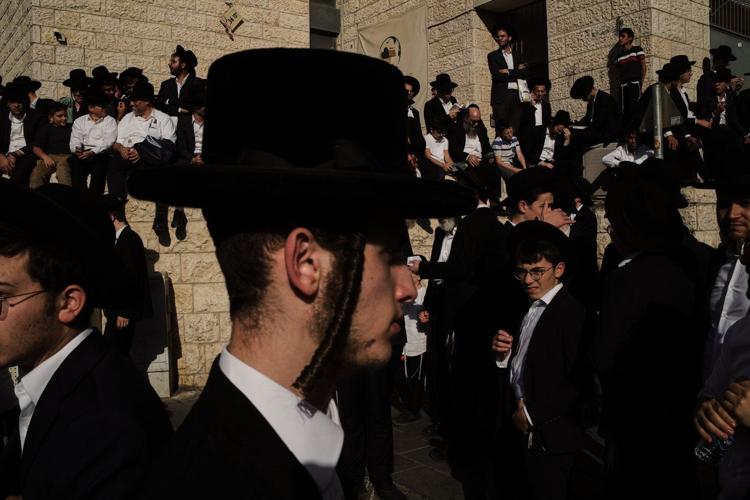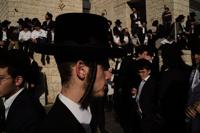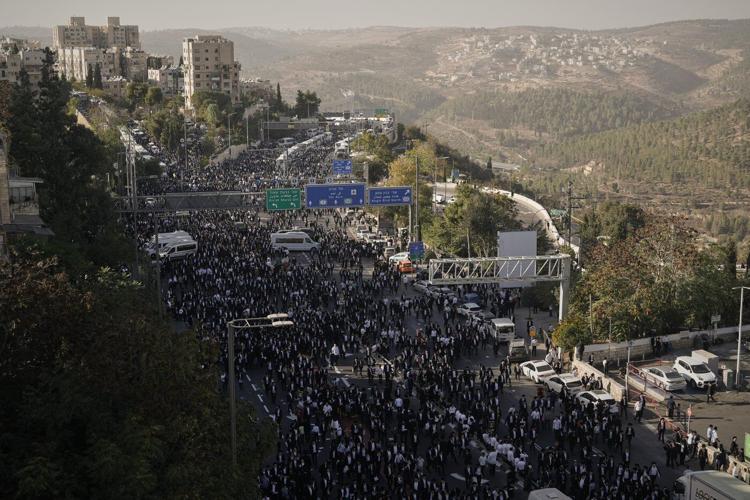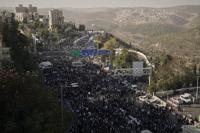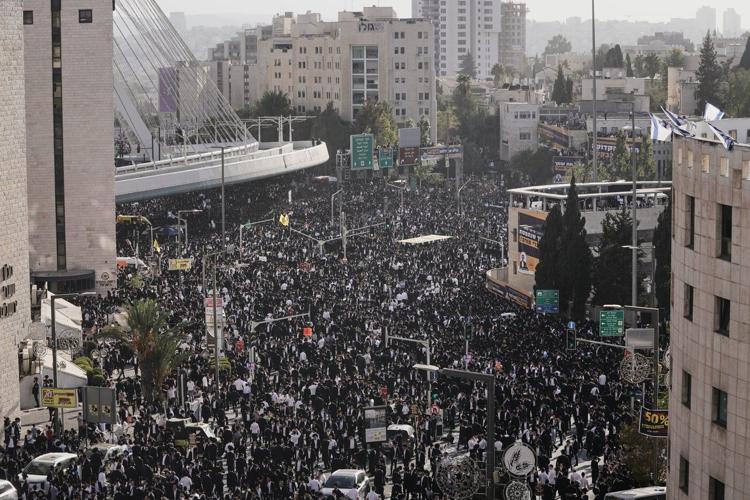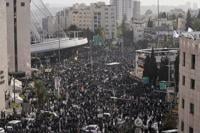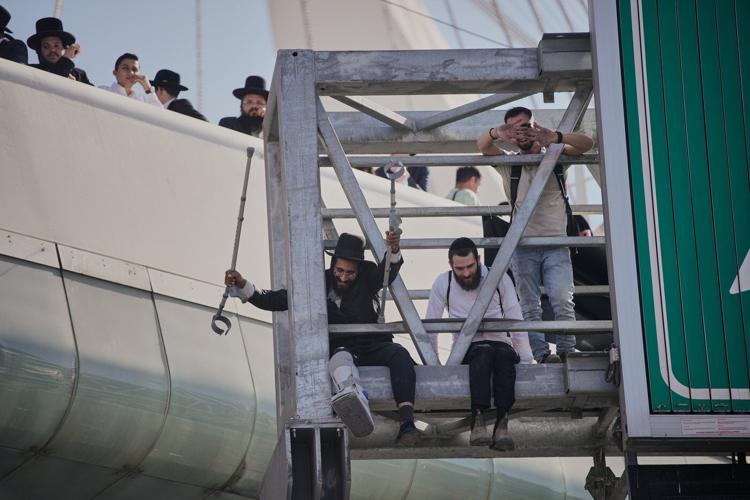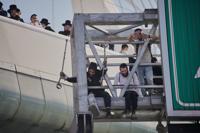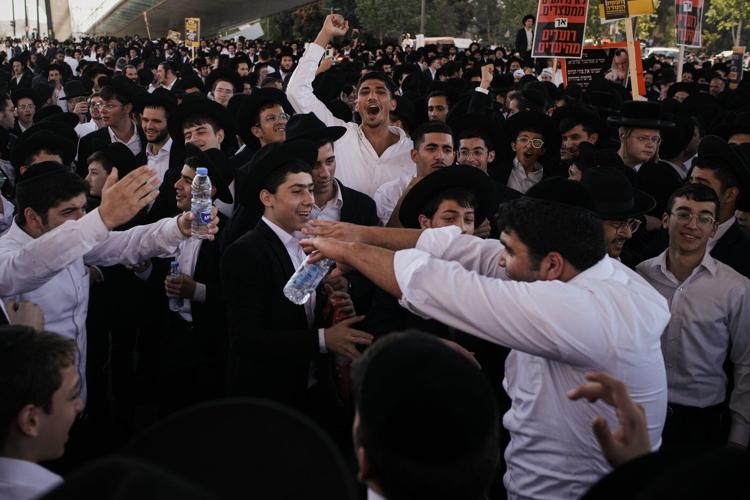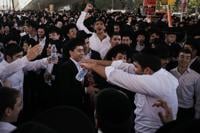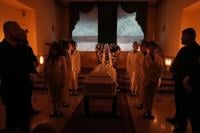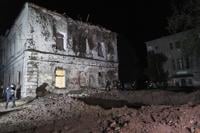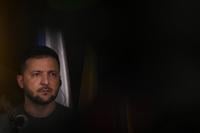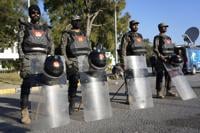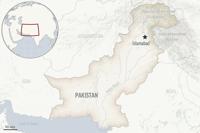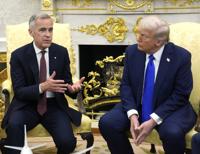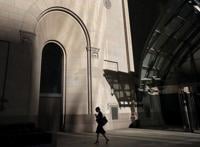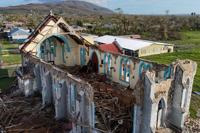JERUSALEM (AP) — Tens of thousands of ultra-Orthodox men covered downtown Jerusalem in a sea of black Thursday to protest plans to draft them into the military, singing, clapping and holding signs saying they would rather go to jail.
Deep divisions in Israeli society over the current draft exemption given to the ultra-Orthodox has emerged as the most serious threat to Prime Minister Benjamin Netanyahu's government.
The embattled leader relies on ultra-Orthodox parties to keep his government limping along, but their attempts to pass a law to permanently exempt ultra-Orthodox Israelis from military service could sink his government and spark early elections.
Israel shut down the major highway at the entrance to Jerusalem and deployed more than 2,000 officers, as tens of thousands of of ultra-orthodox, known as haredim, thronged the streets. One teenager was killed at the largely peaceful protest after falling from a building under construction next to the protest, police said.
The protest largely crippled the city, with roads closed and public transportation halted.
Who are the haredim?
Roughly 1.3 million ultra-Orthodox Jews make up about 13% of population and oppose enlistment because they believe studying full time in religious seminaries is their most important duty.
An enlistment exemption for the ultra-Orthodox goes back to the founding of Israel in 1948, when small numbers of gifted scholars were exempt from the draft. But with a push from politically powerful religious parties, those numbers have swelled over the decades. The court said the exemptions were illegal in 2017, but repeated extensions and government delay tactics have prevented a replacement law from being passed.
The broad exemptions from mandatory military service have reopened a in the country and during the war in Gaza. Over 900 soldiers have been killed since the war began. Many reserve soldiers have served hundreds of days in multiple tours of duty, and the military has repeatedly sounded the alarm that more soldiers are desperately needed to meet �����������’s defense needs.
Staunch opposition to serving in the military
Tens of thousands of haredim gathered Thursday at the entrance of Jerusalem for a lively prayer rally as loud spiritual music blared on speakers, though it was smaller than the hundreds of thousands predicted by the Israeli media.
“The whole thing is a plan to keep us from keeping our religion, we’re not going to agree to send our boys there,” said Ephraim Luff, 65, a full-time seminary student in the ultra-Orthodox city of Bnei Brak and father of eight, who was scrambling to travel to Jerusalem ahead of many of the road closures. “We understand its very clear, it’s not that they need us, it’s that they want to annihilate us religiously.”
The most serious challenge to ����ٲ��Բⲹ���’s government
The country's two ultra-Orthodox parties were an essential part of fragile coalition before they left over the summer in anger over proposed legislation on the military draft. However, they still often vote with Netanyahu, allowing his government to survive.
The insistence of the haredi leaders on passing a law codifying a permanent draft exemption could change that. The issue of haredi enlistment has forced several early elections over the past decade, said Lahav Harkov, a senior fellow at the think tank Misgav Institute for ��ɫtv Security
Elections are currently scheduled for next November, but it’s likely that Netanyahu could be forced to call early elections in the next few months.
The current enlistment law
The trigger for Thursday’s protest was the decision to bring the enlistment legislation for discussion in a Knesset committee next week, despite deep opposition to the bill, including from Netanyahu's own party. This is the first step before the bill can be brought to the general Knesset for a vote.
The haredi members of the Knesset have been unable to obtain the two things their community demands: a permanent draft exemption or increased budgets for their community, explained Shuki Friedman, vice president of the Jewish People Policy Institute, a Jerusalem think tank, and an expert on haredi issues.
A series of Supreme Court cases have chipped away at the budget that allows haredi men to study full-time in exchange for a stipend from the state. So far the parties have located temporary funding as a stop-gap measure, but those stipends are increasingly under threat.
“This is a protest against the government, because it can topple the coalition, and against the opposition so they can show how much power they have,” said Friedman. "And within the haredi world they are worried about the internal pressure, so they are trying to give a show of unity,” he added.
Some voices within the haredi community are advocating for a pragmatic solution, including possibly allowing a small group of haredi men that are not studying Jewish texts full-time to serve in the military, but the protest is an attempt to give a united show of force against any type of compromise, Friedman explained.
—�Ĕ-
Lidman reported from Tel Aviv, Israel. Associated Press writer Josef Federman contributed from Jerusalem.

